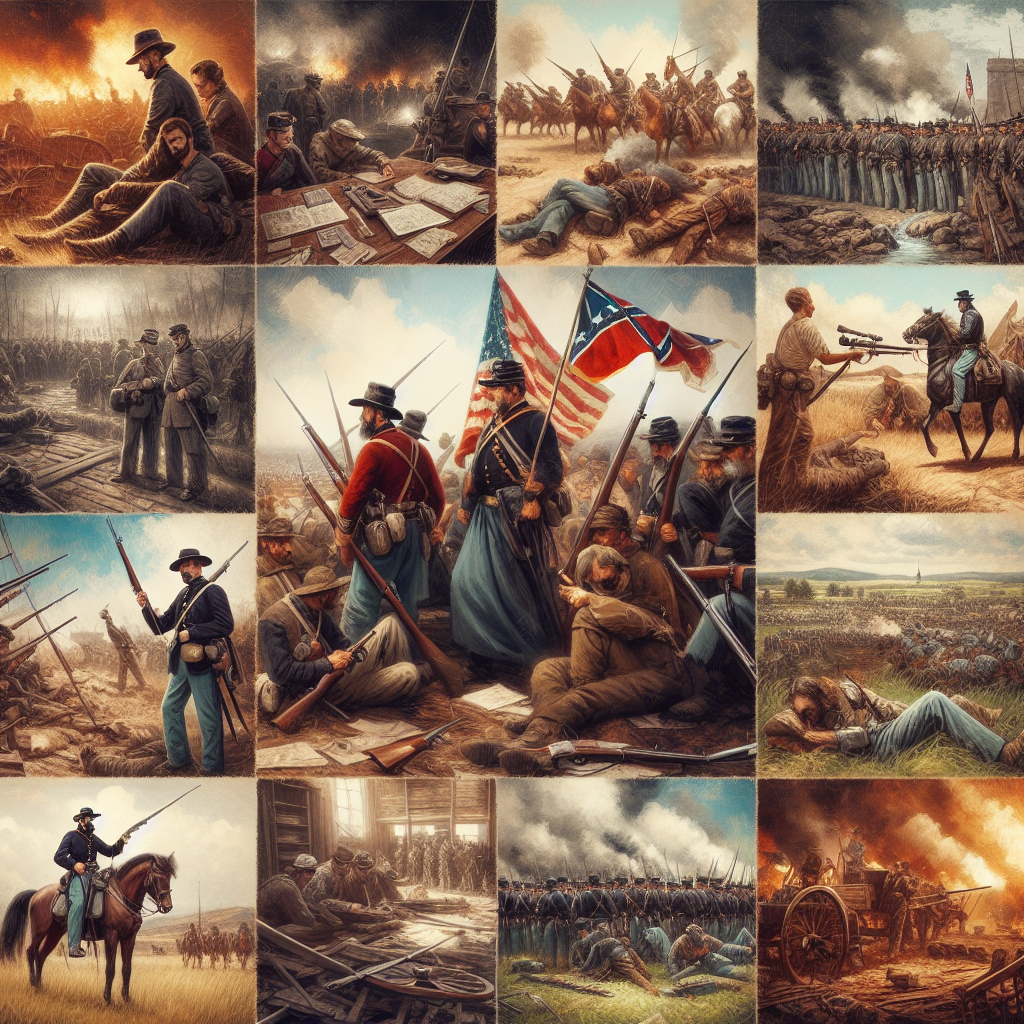Introduction
"Unveiling the Epic Story of The Killer Angels" by Michael Shaara is an evocative portrayal of the Battle of Gettysburg, an event that represents a pivotal moment in American Civil War history. Published in 1974, "The Killer Angels" achieved considerable acclaim, winning the Pulitzer Prize for Fiction in 1975. It has since become an essential part of American literature, offering profound insights into the complexities of war, leadership, and human nature. This book stands out not only as a historical narrative but also as a significant literary achievement within Michael Shaara’s body of work, which includes other explorations of historical events and figures but never matched the critical success of "The Killer Angels." The novel’s significance endures through its vivid depiction of real historical figures and its exploration of timeless themes, resonating with readers long after its release.
Main Themes and Character Development
At the heart of "The Killer Angels" are themes of honor, duty, brotherhood, and the tragic inevitability of conflict. Each is explored through Shaara’s meticulous character development, bringing historical figures to life in ways that transcend dry historical recounting. The book presents an intricate mosaic of perspectives by switching between Union and Confederate viewpoints, highlighting the internal and external battles faced by both sides.
One of the novel’s central figures, Colonel Joshua Lawrence Chamberlain of the Union army, embodies the theme of leadership and moral fortitude. Shaara intricately develops Chamberlain’s character, presenting him as an intellectual, a soldier driven by a profound sense of duty. The novel details Chamberlain’s command during the defense of Little Round Top, a momentous battle within the larger conflict. His leadership is both strategic and compassionate, reflecting the inner conflict and the burden of decision-making in war.
Conversely, General Robert E. Lee is portrayed with a stoic nobility, yet, is a figure weighed down by the past and the burdens of command. Lee’s unwavering sense of duty and belief in his cause are juxtaposed with his right-hand man, General James Longstreet, who is more pragmatic and strategic. Longstreet’s hesitations and tactical insights often clash with Lee’s romantic vision of warfare, a dichotomy that emphasizes the theme of change versus tradition within the novel.
Narrative Techniques
Shaara employs several narrative techniques that contribute significantly to the novel’s impact. One such technique is his use of multiple perspectives, an approach that allows the reader to experience the battle from a variety of angles and emotions. This polyphonic structure marries the realism of historical writing with the drama of a novel, giving voice to the triumphs and tragedies of both sides.
Detailed descriptive narratives immerse the reader in the battlefield’s visceral reality, evoking the sensory experiences of soldiers. Key chapters, like the harrowing depiction of Pickett’s Charge, juxtapose strategic overviews with personal, on-the-ground experiences, offering a holistic view of the chaos and humanity within the battle.
Another noteworthy narrative technique is Shaara’s inclusion of internal monologues. These soliloquies provide introspective insights into the characters’ thoughts and emotions, imbuing them with depth and a sense of individuality. Through these internal reflections, readers gain profound access to each character’s motivations and doubts, elevating the historical figures to relatable, nuanced personalities.
Cultural, Social, and Historical Reflections
"The Killer Angels" is not just a recount of events but a reflective examination of the broader cultural, social, and historical implications of the Civil War. By focusing on key leaders and their personal experiences, Shaara explores the ideological divisions that defined the era. The novel delves into the cultural context of the time, examining how differing beliefs about freedom, state rights, and slavery fueled a conflict that was as much about cultural identity as it was about politics.
By humanizing these historical personas and embedding their narratives within the societal framework of the 1860s, Shaara provides commentary on the enduring struggle between individual belief systems and larger social structures. The book underscores the senseless tragedy of war, offering a critique that remains relevant in any era of conflict.
Legacy and Influence
Since its publication, "The Killer Angels" has left an indelible mark on both literature and popular culture. It served as the primary inspiration for the 1993 film "Gettysburg," which brought Shaara’s vivid historical vision to a broader audience. Moreover, its influence can be observed in the subsequent works of historical fiction that strive to blend accuracy with compelling storytelling.
Shaara’s novel has inspired a deeper understanding and interest in the Civil War, motivating readers and educators alike to explore this formative period in American history through a nuanced lens. The book continues to be a staple in military and historical curricula, affirming its place as a crucial text for understanding the complexities of war and leadership.
Reflective Questions and Conclusion
As we consider the relevance of "The Killer Angels" today, several questions arise: How do the novel’s explorations of leadership and moral decision-making apply to contemporary conflicts? In what ways do the human fears and aspirations illustrated in the book mirror today’s societal challenges? These reflections encourage readers to draw parallels between the past and present, highlighting the timeless nature of Shaara’s work.
In conclusion, "The Killer Angels" is more than a historical account; it’s a profound exploration of humanity’s triumphs and tragedies during one of America’s most defining moments. Michael Shaara’s deft narrative, complex characters, and rich thematic depth invite readers to not only revisit history but also reflect on the enduring conflicts that shape our world. This must-read Civil War classic remains a powerful testament to the enduring struggle for understanding and resolution, making it as relevant today as it was when first penned.
Got more questions? Our personalized Book Explorer AI assistant is here to help. Click here to start a conversation!
[Advertisement]
Looking to find deeper meaning in the books you love? Discover how ANY book relates to positive biblical principles with Books and Scripture GPT‘ from BGodInspired.com. Click here to explore the connections that might surprise you!
[Advertisement]

